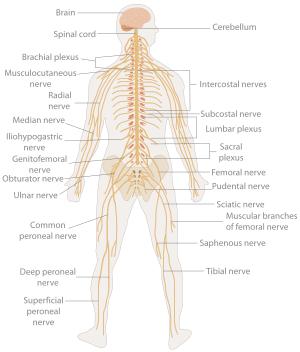Organ system
An organ system is a group of organs that work together as a biological system to perform one or more functions. Each organ does a particular job in the body, and is made up of distinct tissues.

Organs systems and their functions
There are eleven distinct organ systems in human beings, which form the basis of anatomy. Other animals have similar organ systems, although simpler animals may have fewer organs in an organ system or even fewer organ systems. Plants too have organs, such as flowers and leaves, and these are grouped into organ systems as well.
| Organ System | Description | Component Organs |
|---|---|---|
| Respiratory system | breathing: exchange of oxygen and carbon dioxide | nose, mouth, sinus, pharynx, larynx, trachea, bronchi, lungs and diaphragm. |
| Digestive system | digestion: breakdown and absorption of nutrients, excretion of solid wastes | teeth, tongue, salivary glands, esophagus, stomach, liver, gallbladder, pancreas, small intestine, large intestine, rectum and anus |
| Cardiovascular system | circulate blood in order to transport nutrients, waste, hormones, O2, CO2, and aid in maintaining pH and temperature | blood, heart, arteries, veins, capillaries |
| Urinary system | maintain fluid and electrolyte balance, purify blood and excrete liquid waste (urine) | kidneys, ureters, bladder and urethra |
| Integumentary system | exterior protection of body and thermal regulation | skin, hair, exocrine glands, fat, and nails |
| Skeletal system | structural support and protection, production of blood cells | bones, cartilage, ligaments and tendons. |
| Muscular system | movement of body, production of heat | skeletal muscles, smooth muscles and cardiac muscle |
| Endocrine system | communication within the body using hormones made by endocrine glands | hypothalamus, pituitary, pineal gland, thyroid, parathyroid and adrenal glands, ovaries, testes |
| Lymphatic system | return fluids (lymph) to blood stream, aid immune responses, form white blood cells | lymph, lymph nodes, lymph vessels, tonsils, spleen, thymus |
| Nervous system | sensing and processing information, controlling body activities | brain, spinal cord, nerves, sensory organs (e.g. vision, smell, taste, hearing) |
| Reproductive system | sex organs involved in reproduction | ovaries, fallopian tubes, uterus, vagina, mammary glands, penis, testes, vas deferens, seminal vesicles and prostate |
There are other systems in the body that are not organ systems. For example, the Immune system protects the organism from infection, but it is not an organ system as it is not composed of organs.
Some organs are in more than one system. For example, the nose is in both the respiratory system and also is a sensory organ in the nervous system. The testes and ovary are both part of the reproductive systems and endocrine systems.
| This article is part of a series on the |
| Development of organ systems |
|---|
| Nervous system |
| Digestive system |
| Reproductive system |
| Urinary system |
| Endocrine system |
| Human development |
| Circulatory system |